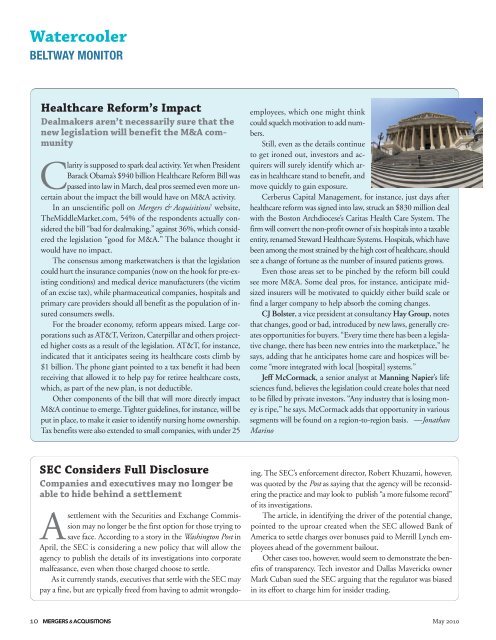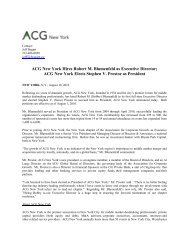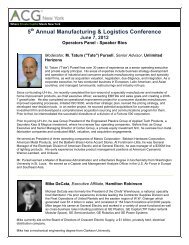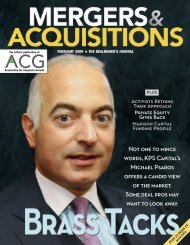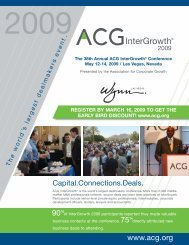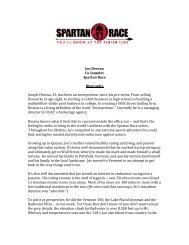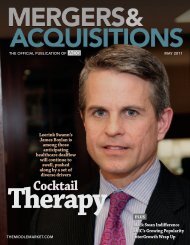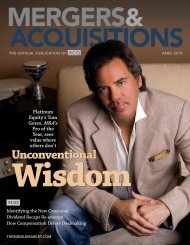Private equity sponsors struggle to make sense of the new ...
Private equity sponsors struggle to make sense of the new ...
Private equity sponsors struggle to make sense of the new ...
You also want an ePaper? Increase the reach of your titles
YUMPU automatically turns print PDFs into web optimized ePapers that Google loves.
WatercoolerBELTWAY MONITORHealthcare Reform’s ImpactDeal<strong>make</strong>rs aren’t necessarily sure that <strong>the</strong><strong>new</strong> legislation will benefit <strong>the</strong> M&A communityClarity is supposed <strong>to</strong> spark deal activity. Yet when PresidentBarack Obama’s $940 billion Healthcare Reform Bill waspassed in<strong>to</strong> law in March, deal pros seemed even more uncertainabout <strong>the</strong> impact <strong>the</strong> bill would have on M&A activity.In an unscientific poll on Mergers & Acquisitions’ website,TheMiddleMarket.com, 54% <strong>of</strong> <strong>the</strong> respondents actually considered<strong>the</strong> bill “bad for dealmaking,” against 36%, which considered<strong>the</strong> legislation “good for M&A.” The balance thought itwould have no impact.The consensus among marketwatchers is that <strong>the</strong> legislationcould hurt <strong>the</strong> insurance companies (now on <strong>the</strong> hook for pre-existingconditions) and medical device manufacturers (<strong>the</strong> victim<strong>of</strong> an excise tax), while pharmaceutical companies, hospitals andprimary care providers should all benefit as <strong>the</strong> population <strong>of</strong> insuredconsumers swells.For <strong>the</strong> broader economy, reform appears mixed. Large corporationssuch as AT&T, Verizon, Caterpillar and o<strong>the</strong>rs projectedhigher costs as a result <strong>of</strong> <strong>the</strong> legislation. AT&T, for instance,indicated that it anticipates seeing its healthcare costs climb by$1 billion. The phone giant pointed <strong>to</strong> a tax benefit it had beenreceiving that allowed it <strong>to</strong> help pay for retiree healthcare costs,which, as part <strong>of</strong> <strong>the</strong> <strong>new</strong> plan, is not deductible.O<strong>the</strong>r components <strong>of</strong> <strong>the</strong> bill that will more directly impactM&A continue <strong>to</strong> emerge. Tighter guidelines, for instance, will beput in place, <strong>to</strong> <strong>make</strong> it easier <strong>to</strong> identify nursing home ownership.Tax benefits were also extended <strong>to</strong> small companies, with under 25employees, which one might thinkcould squelch motivation <strong>to</strong> add numbers.Still, even as <strong>the</strong> details continue<strong>to</strong> get ironed out, inves<strong>to</strong>rs and acquirerswill surely identify which areasin healthcare stand <strong>to</strong> benefit, andmove quickly <strong>to</strong> gain exposure.Cerberus Capital Management, for instance, just days afterhealthcare reform was signed in<strong>to</strong> law, struck an $830 million dealwith <strong>the</strong> Bos<strong>to</strong>n Archdiocese’s Caritas Health Care System. Thefirm will convert <strong>the</strong> non-pr<strong>of</strong>it owner <strong>of</strong> six hospitals in<strong>to</strong> a taxableentity, renamed Steward Healthcare Systems. Hospitals, which havebeen among <strong>the</strong> most strained by <strong>the</strong> high cost <strong>of</strong> healthcare, shouldsee a change <strong>of</strong> fortune as <strong>the</strong> number <strong>of</strong> insured patients grows.Even those areas set <strong>to</strong> be pinched by <strong>the</strong> reform bill couldsee more M&A. Some deal pros, for instance, anticipate midsizedinsurers will be motivated <strong>to</strong> quickly ei<strong>the</strong>r build scale orfind a larger company <strong>to</strong> help absorb <strong>the</strong> coming changes.CJ Bolster, a vice president at consultancy Hay Group, notesthat changes, good or bad, introduced by <strong>new</strong> laws, generally createsopportunities for buyers. “Every time <strong>the</strong>re has been a legislativechange, <strong>the</strong>re has been <strong>new</strong> entries in<strong>to</strong> <strong>the</strong> marketplace,” hesays, adding that he anticipates home care and hospices will become“more integrated with local [hospital] systems.”Jeff McCormack, a senior analyst at Manning Napier’s lifesciences fund, believes <strong>the</strong> legislation could create holes that need<strong>to</strong> be filled by private inves<strong>to</strong>rs. “Any industry that is losing moneyis ripe,” he says. McCormack adds that opportunity in varioussegments will be found on a region-<strong>to</strong>-region basis. —JonathanMarinoSEC Considers Full DisclosureCompanies and executives may no longer beable <strong>to</strong> hide behind a settlementAsettlement with <strong>the</strong> Securities and Exchange Commissionmay no longer be <strong>the</strong> first option for those trying <strong>to</strong>save face. According <strong>to</strong> a s<strong>to</strong>ry in <strong>the</strong> Washing<strong>to</strong>n Post inApril, <strong>the</strong> SEC is considering a <strong>new</strong> policy that will allow <strong>the</strong>agency <strong>to</strong> publish <strong>the</strong> details <strong>of</strong> its investigations in<strong>to</strong> corporatemalfeasance, even when those charged choose <strong>to</strong> settle.As it currently stands, executives that settle with <strong>the</strong> SEC maypay a fine, but are typically freed from having <strong>to</strong> admit wrongdoing.The SEC’s enforcement direc<strong>to</strong>r, Robert Khuzami, however,was quoted by <strong>the</strong> Post as saying that <strong>the</strong> agency will be reconsidering<strong>the</strong> practice and may look <strong>to</strong> publish “a more fulsome record”<strong>of</strong> its investigations.The article, in identifying <strong>the</strong> driver <strong>of</strong> <strong>the</strong> potential change,pointed <strong>to</strong> <strong>the</strong> uproar created when <strong>the</strong> SEC allowed Bank <strong>of</strong>America <strong>to</strong> settle charges over bonuses paid <strong>to</strong> Merrill Lynch employeesahead <strong>of</strong> <strong>the</strong> government bailout.O<strong>the</strong>r cases <strong>to</strong>o, however, would seem <strong>to</strong> demonstrate <strong>the</strong> benefits<strong>of</strong> transparency. Tech inves<strong>to</strong>r and Dallas Mavericks ownerMark Cuban sued <strong>the</strong> SEC arguing that <strong>the</strong> regula<strong>to</strong>r was biasedin its effort <strong>to</strong> charge him for insider trading.10 MERGERS & ACQUISITIONS May 2010


